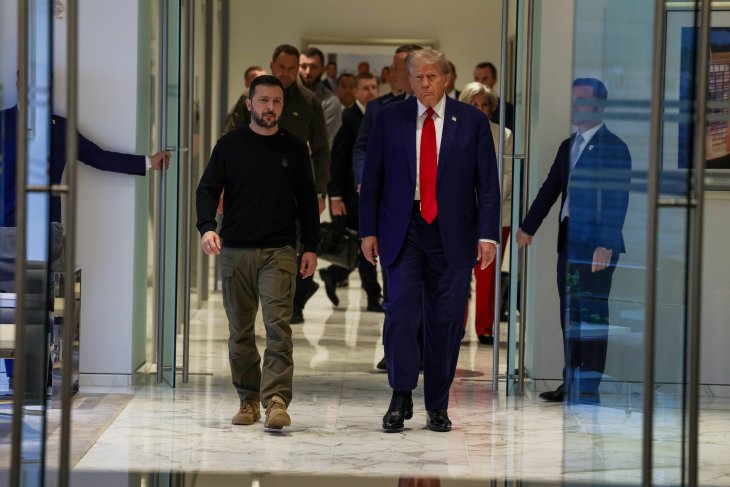Is the Ukrainian president weakened?

Volodymyr Zelensky and Donald Trump 27 September 2024 in New York City. Photo: Alex Kent/Getty Images
Sir Michael Howard, one of the most renowned war historians of all time, often pointed out that wars were lost or won as a result of events that took place far from the front lines. The past weeks have powerfully reminded us of the truth in Howard’s observation.
Even without a rapidly escalating war between Israel and Hezbollah, there was always a significant possibility that Zelensky’s “victory plan” would fizzle out without any political effect in the U.S. or elsewhere. The plan’s great weakness lies in its heavy reliance on other countries making decisive actions in Ukraine’s favor, leaving Ukraine’s fight for freedom dependent on “events that take place far from the front lines.”
The “victory plan” turned out to contain little that was new and instead focused on familiar topics, such as Ukraine’s need for more long-range weapons systems and the removal of restrictions on using them against targets inside Russia.
The goal of the entire “victory plan” is to strengthen Ukraine’s military position to the point where Putin is pressured into good-faith negotiations, and this in the relatively near future. Unfortunately, there is little indication that this goal has been achieved. Ukraine has been promised further support from Biden, but nothing that has the potential to significantly change the overall situation in Kyiv’s favor in the near future.
There is a line from NATO’s summit in Washington in July to the UN General Assembly last week and meetings with top U.S. politicians. Both were high-profile events that did not realize their potential to significantly accelerate support for Ukraine. This is concerning, as it seems overwhelmingly likely that the will to do so is not really there. Furthermore, the impression left by Zelensky is that the “victory plan” has been greatly oversold, with much fanfare followed by little impact.
The Ukrainian president has not read well the political mood in the U.S. as the election campaign heats up. This is quite surprising, as one of Zelensky’s greatest strengths has been his ability to deliver political messages that resonate well.
In many ways, the idea of presenting the “victory plan” to Biden and Harris at this moment was a good one, offering Biden a chance to “make history,” as Zelensky put it. Biden likely does want to make history, and already has, through his decision not to seek re-election. The next goal is to ensure that Kamala Harris wins the presidential election in November. In this context, further increases in support for Ukraine may not be a winning issue for Harris.
In U.S. foreign policy, most pieces on the Middle East chessboard have been overturned. All foreign policy decisions by the current administration until after the presidential election will only consider whether they are believed to positively or negatively impact Harris’s electoral chances.
Zelensky’s visit likely strained relations with the Republicans further. The relatively cold shoulder Kyiv received from Trump and key Republican politicians suggests that, in this regard, they are aligned with the Democrats—ramping up support for Ukraine does not win votes for anyone.
Zelensky’s visit to an ammunition factory in the swing state of Pennsylvania was described by Republicans as inappropriate interference with the U.S. election. The situation was not improved when Zelensky remarked that “Trump doesn’t really know how to stop the war,” which, while certainly true, was nevertheless a significant diplomatic misstep. At the press conference with Trump, the former president was more focused on saying nice things about Putin than about Zelensky.
Last week was meant to be Ukraine’s week, at the UN and with key US politicians. No new decisions of a principled nature emerged from the Biden administration. Unfortunately, it also seems that Zelensky worsened relations with Trump and key Republican politicians.
A positive note for Kyiv was that only 17 countries were present when China and Brazil tried to promote their strongly pro-Russian peace plan on the sidelines of the General Assembly.
Zelensky can likely draw three conclusions:
- The Biden administration’s top priority is that Harris wins the election, and little will happen until then.
- If Trump becomes the next president, Ukraine, Europe, and others face an uncertain future.
- The U.S. and UN visits have shown a Ukrainian president with less ability to generate international support, and as a consequence, a president who is also weakened on the home front.
Events that take place far from the front lines can still have major consequences. Michael Howard would have nodded in recognition.
The Author
Lieutenant General (Ret.); president of Norges Forsvarsforening (the Norwegian Defence Association – NFF); senior advisor, the Norwegian Atlantic Committee. Dalhaug served as the Senior Manager for the OSCE Special Monitoring Mission to Ukraine (from 2016 to 2019.
- This text was published in Norwegian by Dagens Næringsliv 7 October 2024. The author is a member of the Advisory Board for the PRIO project Russian Approaches to Peace Processes.